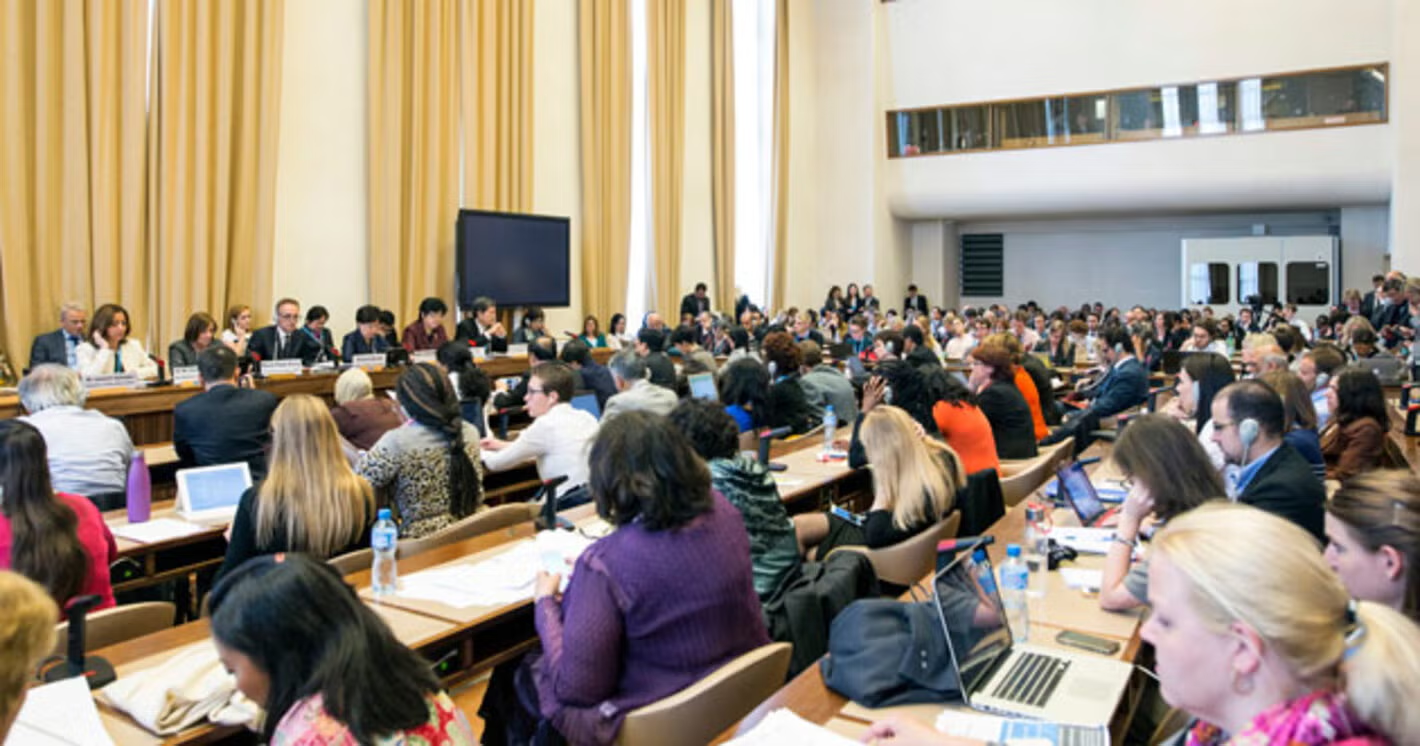
Geneva, 24 May 2016 (PAHO/WHO) - On its second day of sessions, the 69th World Health Assembly focused on climate change and health, as well as on the road to achieving the health-related Sustainable Development Goals (SDGs) and the need for multisectoral action to achieve them.
The invited speaker at the World Health Assembly, Christiana Figueres, Executive Secretary of the United Nations Framework Convention on Climate Change, stressed the links between climate change and health, including those related to the spread of vector-borne diseases. Her address was followed by a technical briefing that underscored the need for multisectoral action to achieve the health-related Sustainable Development Goals, and a new resolution was adopted on meeting these goals.
Climate change and health
 Figueres thanked Dr. Margaret Chan, Director-General of the World Health Organization, for first insisting on the need to reach an agreement on climate change because of its effects on health.
Figueres thanked Dr. Margaret Chan, Director-General of the World Health Organization, for first insisting on the need to reach an agreement on climate change because of its effects on health.
Congratulating the world's heads of state for reaching last year's Paris Agreement on climate change, Figueres called upon the Ministers of Health to take the lead, noting that one of the most urgent aspects of climate change is its impact on health. Nevertheless, only 15% of the countries that have drawn up plans for climate change refer to health in those plans.
Calling for immediate action, she ended with a warning that if the world does not fundamentally change its approach to energy within the next 5 years, there is a risk that damage to the atmosphere will be irrevocable and its impact on health could last for decades.
Sustainable Development Goals
The delegates agreed to strengthen national health systems in the effort to achieve universal health coverage, recognizing that this approach is key to meeting the health-related Sustainable Development Goals.
The resolution that was adopted highlights the need to strengthen a range of essential public health functions. This will involve investing adequate and sustainable resources in health-system strengthening; enhancing the education, recruitment, and retention of health workers; tackling social, environmental, and economic determinants of health; and improving the monitoring and analysis of health outcomes.
In September 2015, the United Nations General Assembly adopted the SDGs, an ambitious set of 17 goals with 169 targets for achieving a fairer, safer, and healthier world by 2030.
The health-related targets are concentrated in, but not limited to, Goal 3: "Ensure healthy lives and promote well-being for all at all ages." They include a target of achieving universal health coverage, including financial risk protection, access to quality essential health care services, and access to safe, effective, quality, and affordable essential medicines and vaccines for all.
Health coverage, supported by resilient national health systems based on primary care, is widely regarded as the best defense that countries can have against outbreaks of infectious diseases such as Ebola and Zika, and against the growing burden and cost of noncommunicable diseases like cancer and diabetes. With its focus on equity, it represents an essential strategy for fulfilling one of the core principles of the SDGs: leaving no one behind.
In 2014, the countries of the Americas made a commitment in 2014 to step up their efforts to achieve universal health coverage and access to health services. That same year, they also committed to an action plan to promote health in all public policies. This means that health implications will be systematically considered in all decision-making; synergies will be sought to protect and promote health; and steps will be taken to address the social and environmental conditions that stand in the way of all people achieving maximum health.
Chile and other countries agree on the need for multisectoral action to achieve the Sustainable Development Goals
During a technical briefing session at the 69th World Health Assembly, Chile and other countries agreed on the need to strengthen multisectoral action in order to meet the new SDGs by 2030.
Dr. Margaret Chan, WHO Director-General, cited three elements that are essential to meeting the SDGs: innovation, coherent policies, and a focus on adolescents.
Chilean Vice Minister of Health Gisela Alarcón reported that her country has incorporated the SDGs into the national health agenda with a strong intersectoral component. An example is the program "Chile Grows With You"(Chile Crece Contigo), a child protection system that integrates the work of the ministries of Health, Social Development, and Education. Starting with pregnancy, this intersectoral initiative accompanies the child up to 4 years of age—to be extended to 9 years in 2016. She went on to note that the country's "development model had generated wealth and increasing inequalities, with no regard for equity."



